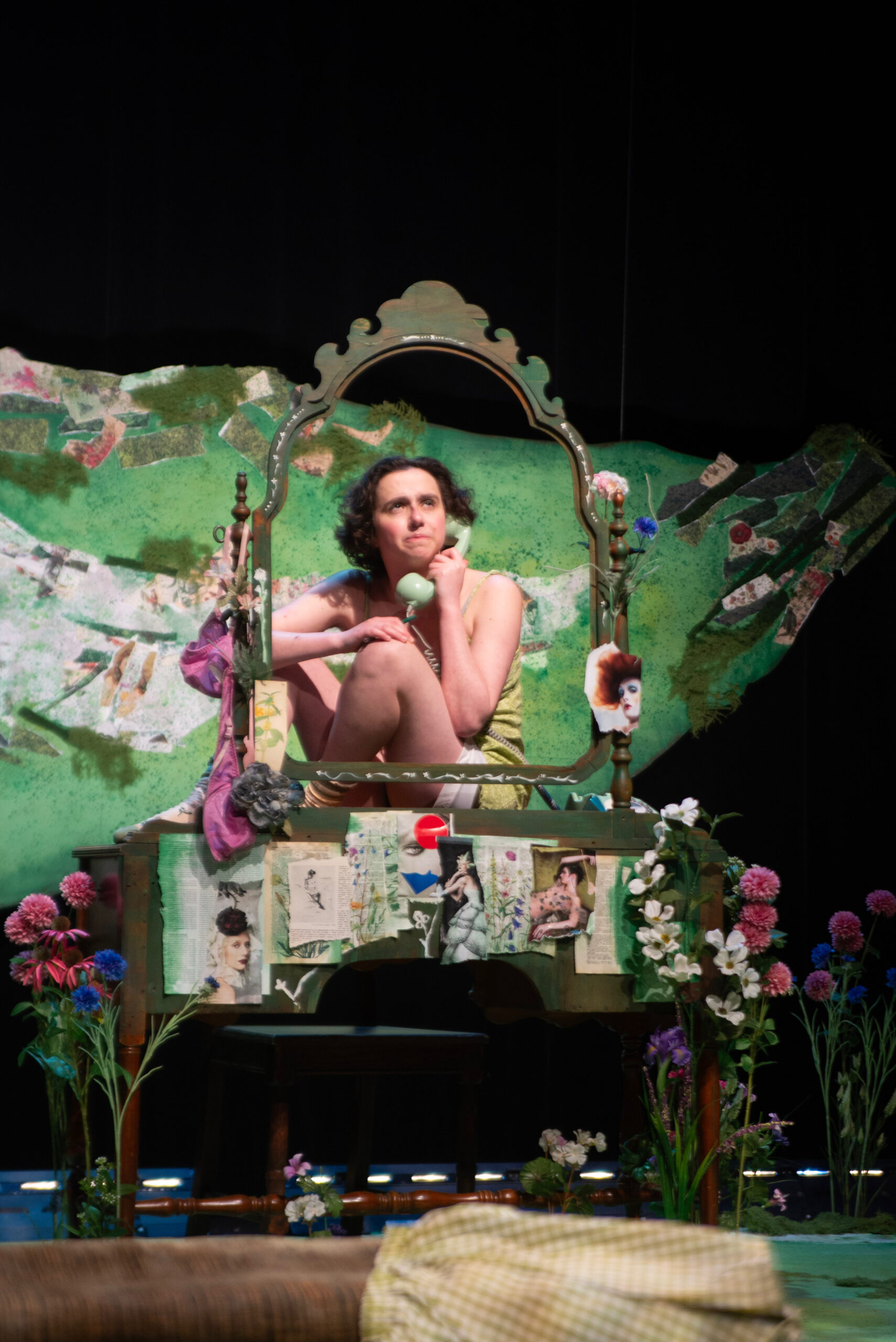Mira Pickus ’25 debuts original, one-woman show “mint frappe” to sold-out audiences
April 24, 2025
 Courtesy of Mira Pickus
Courtesy of Mira PickusWhen Mira Pickus ’25 drafted a proposal in December 2023 to write a play, she had no idea that it would turn into her one-woman show “mint frappe,” which she directed, designed and performed herself last Thursday and Friday to two sold-out audiences in Wish Theater.
“Vaguely at the back of my head, I was like, ‘It would be awesome to do a one-woman show, but I don’t know what will happen.’ And I would say for most of the summer, I was pretty sure that there wouldn’t be a show,” Pickus said.
Yet after long days of writing in Dog Bar Jim and Massachusetts Hall last summer, the bits and pieces that Pickus had toiled over came together in the final days before her draft was due to her summer advisor, Professor of Theater Abigail Killeen.
“In those last weeks, everything except two pieces in the script were completely revamped, scrapped, rewritten, because I spent most of the summer writing and fleshing things out,” Pickus said. “Everything came together so quickly.”
At that moment, Pickus’ aspirational endeavor became a tangible undertaking that she planned to debut in the spring with conditional department support.
Rooted in themes of disgust and vanity, “mint frappe” grapples with the interplay of conflicting ideals within womanhood and beauty. The work theatrically combines autographic fiction with theories and texts that Pickus read in several courses related to those themes.
“The inspiration was personal, just a lot of themes and issues that felt recurrent in my life for basically the past four years, and I always felt like there were just some specific things, like the stuff on disgust and vanity, that intersected with stuff I had read in class,” Pickus said.
Pickus drew inspiration from several works she studied in her Mean Women Writers course taught by Professor of English Marilyn Reizbaum, which included texts by Queer Studies esthetic theorist Sianne Ngai and “A Telephone Call” by Dorothy Parker. She also highlighted Shakespearean influences from classes taught by Professor of English Aaron Kitch.
“There’s a lot of reference to Hamlet and Shakespearean things and this thing called the green sickness from this Shakespearean era, where it was believed that if a girl didn’t marry and have sex that she would become sick and die,” Pickus said.
From the set design to several scenes, the play fixates on its namesake—the imaginary cosmetic color the main character calls “mint frappe.” However, when reflecting on the centrality of green, Pickus shared that it was accidental but also extremely intentional.
“It happened in stages,” Pickus said. “I started with three themes—disgust, vanity and nourishment—and I had a bunch of ideas around them, and I wrote an essay very early on, in the nourishment category, that had a little meditation on how cosmetic colors are named, and I wear a lot of green.”
Although Pickus started the project with this scene, it was only during a readthrough of the show in the fall with friends that she discovered the invisible string tying green to not only exuberance but also the inevitability of its sourness and decay.
“Green is kind of the main character of the play,” Pickus said. “It sort of struck us then that the major throughline was green and the botanicalness and the way that green is about beauty and adornment, in terms of the eyeliners, and then also sort of about these very haunting feminine themes, about desirability, illness and rot.”
The concept of the set was born from that initial reaction to the text and the nuanced emotions triggered by the green of “mint frappe.” The resulting design resembled an apartment interior ornate with green floral elements and flooring.
“We knew we kind of wanted the set to not be quite in realism, because the play isn’t quite in realism. It’s sort of in a domestic space, but it’s also disjunct. And it’s not really tethered to a specific time period or location. So we liked the idea of the set being really verdant with plants overtaking it. And it sort of being an apartment, and it sort of being the natural space. That seemed appropriate,” Pickus said.
Pickus comes from a strong comedic background and is a member of Purity Pact, a student sketch and stand-up comedy group, but she knew from the beginning that she wanted the show to present much differently from her standup work.
“I wanted it to be, in general, a bit heavier than my stand up,” Pickus said. “But the idea was to use humor as this way to endear the audience—you get the audience to trust you, and you have people laughing, … and then you give them something really serious.”
The feedback that Pickus received from the show gratified the arduous process and vulnerability embedded in developing the play.
“I think, because this show is a lot of me writing around stuff that’s very difficult for me personally, you forget that the cliché that the personal is universal is very true,” Pickus said. “A lot of people who I did not expect have come to me have said, ‘That really resonated with me,’ and that’s like the best compliment as an artist.”
As students continue to discuss the play with her this week, Pickus expressed satisfaction with how her work has been received.
“I like the idea that it’s kind of permeating people’s consciousness. That’s what I want,” Pickus said.

Comments
Before submitting a comment, please review our comment policy. Some key points from the policy: